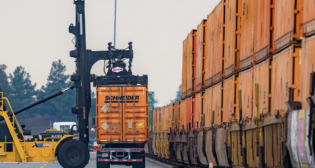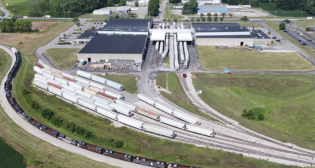
CABT: State troopers oppose bigger trucks
Written by William C. Vantuono, Editor-in-Chief“Speaking on behalf of the more-than 45,000 members of the National Troopers Coalition, I can tell you that law enforcement officers have known for quite some time that bigger trucks threaten highway safety, and this poll shows that the public knows it, too,” said NTC Chairman Mat Hodapp, a Minnesota state trooper.
CABT commissioned the live-operator survey of 1,000 nationwide respondents. The poll, conducted Jan. 5-8, 2015 by Harrisburg, Pa.-based Harper Polling, had a margin of error of plus or minus 3.1%. The results said that 76% of respondents oppose longer and heavier semitrailer trucks, while 15% support them and 9% are unsure.
“This nationwide poll illustrates that motorists clearly do not want to be flanked by longer or heavier tractor-trailers on the highway, and that goes for Republicans and Democrats alike,” said Brock McCleary, president of Harper Polling. “The trend was largely consistent across political identification, region, age and gender. Also, respondents seem concerned with elected officials who support truck size and weight increases: 57% of respondents said they are less likely to vote for a candidate for Congress who supports longer and heavier trucks.
“As a state trooper, I’ve always promised to keep public safety as my top priority,” said Mat Hodapp. “For more than 20 years, I’ve committed myself to stopping the expansion of bigger trucks. There’s nothing safe about them on our highways. Congress should listen to law enforcement and the public on this.”
A 2013 independent study led by Marshall University found that 95% of law enforcement officers surveyed “believe that adding more weight makes a truck more dangerous, CABT noted. “The same study found that 88% of truck drivers surveyed say that greater use of longer-combination vehicles would negatively impact highway safety.”
 “We’ve heard both sides of this issue, and our position remains the same—there’s no justification for longer or heavier trucks,” Hodapp said. “Bigger-truck proponents talk about ‘modernizing’ our transportation policy, but I don’t think there is anything ‘modern’ about compromising public safety. Bigger trucks mean more severe crashes and more lives lost. Some trucking companies have a vested economic interest in the outcome of this legislation, but our interest as law enforcement officers is the safety of motorists.”
“We’ve heard both sides of this issue, and our position remains the same—there’s no justification for longer or heavier trucks,” Hodapp said. “Bigger-truck proponents talk about ‘modernizing’ our transportation policy, but I don’t think there is anything ‘modern’ about compromising public safety. Bigger trucks mean more severe crashes and more lives lost. Some trucking companies have a vested economic interest in the outcome of this legislation, but our interest as law enforcement officers is the safety of motorists.”
January’s Harper poll found that 79% of respondents “are very or somewhat convinced that heavier and longer trucks will lead to more braking problems and longer stopping distances, causing an increase in the number of accidents involving trucks,” CABT said. “In 2006, a Federal Motor Carrier Safety Administration (FMCSA) report to Congress found that 29% of truck crashes involved some form of braking problem. Nearly one in five trucks had out-of-service violations during the Commercial Vehicle Safety Alliance’s Roadcheck 2014, and 46% of those trucks were placed out of service due to braking issues.”
CABT cited several other statistics that support its call for a ban on heavier trucks and LCVs (long-combination vehicles): “The National Highway Traffic Safety Administration reported earlier this month that highway fatalities from truck-involved crashes on U.S. roads rose for the fourth straight year, while the overall number of vehicle-related fatalities declined in 2013. The U.S. Department of Transportation reviewed 30 years of research in 2013 and found that gross vehicle weight would appear to be associated with higher crash rates. The Department’s 2000 study found that multi-trailer trucks are already more dangerous than single-trailer trucks, and have an 11% higher fatal crash rate. The 2013 Marshall-led study published similar findings, concluding that double-trailer trucks also have an 11%higher fatality rate than single-trailer trucks.”
“On Capitol Hill, groups composed of some of the nation’s largest and most powerful trucking and shipping interests are lobbying Congress to lift the 1991 federal freeze on LCVs—triple-trailer trucks and long double-trailer trucks,” CABT said. “Other proposals include heavier single-trailer trucks that are up to 97,000 pounds—more than 8 tons heavier than today’s 80,000-pound weight limit.”
“At the same time, large trucking companies such as Con-Way Freight, Old Dominion Freight Line, and FedEx are pushing legislation to require every state to permit even longer double-trailer trucks,” CABT said. “Their proposal would lengthen current double 28-foot trucks by 10 feet to double 33-foot trucks. Often referred to as ‘Twin 33s,’ double 33-foot trucks are 17 feet longer than the standard 53-foot trucks on many roads today. Opponents of heavier and longer trucks, including law enforcement and first responder organizations, are asking constituents to call their respective U.S. Representatives and Senators and urge them to vote against any increase in truck size or weight limits.”



